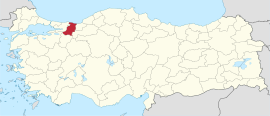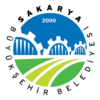Sakarya Province
Sakarya Province | |
|---|---|
 | |
 Location of the province within Turkey | |
| Country | Turkey |
| Seat | Adapazarı |
| Government | |
| • Mayor | Yusuf Alemdar (AKP) |
| • Vali | Rahmi Doğan |
| Area | 4,824 km2 (1,863 sq mi) |
| Population (2022)[1] | 1,080,080 |
| • Density | 220/km2 (580/sq mi) |
| Time zone | UTC+3 (TRT) |
| Area code | 0264 |
| Website | www www |
Sakarya (Turkish: Sakarya ili) is a province and metropolitan municipality in Turkey, located on the coast of the Black Sea. Its area is 4,824 km2,[2] and its population is 1,080,080 (2022).[1] The Sakarya River creates a webbing of estuaries in the province, which is in the Marmara Region. The adjacent provinces are Kocaeli to the west, Bilecik to the south, Bolu to the southeast and Düzce to the east. The capital of Sakarya is Adapazarı. Its climate is maritime in the north and humid subtropical in the south and changes by the distance to the Black Sea. Sakarya is on the Ankara-Istanbul highway and is also connected by rail. Sakarya is serviced by Istanbul's Sabiha Gökçen International Airport. The mayor of Sakarya is Yusuf Alemdar as of 2024 (AKP).[3] The city of Sakarya, one of the most important cities in Turkey for its rapid growth and development, is also noteworthy for its natural beauties and its cultural richness. It is one of the paradise-like spots of the country with its sea, beaches, lakes, rivers, highlands, thermal springs, traditional Ottoman lifestyle districts such as Taraklı and Geyve and noteworthy historical relics that are inherited from the Byzantine and the Ottoman eras. The Turks conquered the city of Sakarya in the 13th century. There was intensive immigration from the Caucasus and the Balkans in the 18th and the 19th centuries. The last massive immigration was in 1989 from Bulgaria. The city has developed industry from being a transportation crossroads and still has inward domestic migration.


History
[edit]It was founded in 1400 by 400 Armenian immigrant families who escaped from Timur's oppression in Sivas and was named "Donigaşen" after the name of their leaders. Today's inhabitants are Manavs. The Native Muslims are Armenians and Greeks who gradually converted to Islam, and it should not be ignored that Turk households settled in the region. Adapazarı's known name in Turkish at that time was Adacık and Ada. The source of the information that the region was conquered by Orhan Gazi and opened to settlement is also unknown.[4][5][6][7] Adapazarı was the village of Ada in 1573, a sub-district in 1646, a village in Akyazı in 1658, and administrative district of a qadi in 1692 and again a sub-district in 1742. The residency area had the status of a district between 1837 and 1954 during the Ottoman and the Republican eras. Adapazarı was a district of Kocaeli for many years but separated from it and took the name of Sakarya on June 22, 1954 by Law 6419. Adapazarı took the name of Sakarya since it was the centre of the districts f Akyazı, Geyve, Hendek and Karasu. On December 1, 1954, the first governor, Nazım Üner, began active duty with ceremonies.
Adapazarı was experiencing a rapid growth and great development in the centre of Akova, but the city had to face massive destruction during the great Marmara earthquake, on August 17, 1999.
Districts
[edit]
Greater Adapazarı
Area: 1,156 sq km, Population: 670,000 (2022)
Rest of Sakarya
See also
[edit]References
[edit]- ^ a b "Address-based population registration system (ADNKS) results dated 31 December 2022, Favorite Reports" (XLS). TÜİK. Retrieved 19 September 2023.
- ^ "İl ve İlçe Yüz ölçümleri". General Directorate of Mapping. Retrieved 19 September 2023.
- ^ "Yusuf Alemdar Sakarya Büyükşehir Belediye Başkanı". Retrieved 22 October 2024.
- ^ Adapazarlı Papaz Krikor Vekayinamesi (Püzantion dergisi, 31 Ocak 1912).
- ^ XV. Yüzyıldan 1915’e Günümüz Türkiye’sinde Ermenilerin Ticari-Ekonomik Faaliyeti Toplu belgeler, derleyen: Khaçadur Dadayan, «Gasprint» Yayıncılık, Yerevan, 2012
- ^ "Donigaşen'' ya da "Adapazarı", Elif Yalaz, 25 Nisan 2020
- ^ "Nişanyan Yer Adları: İndex Anatolicus".
External links
[edit]- (in Turkish) Sakarya governor's official website
- (in Turkish) Sakarya municipality's official website
- (in Turkish) Cark Caddesi Archived 2012-02-05 at the Wayback Machine
- (in English) Sakarya weather forecast information
- Sakarya University homepage



